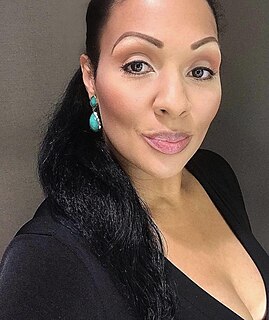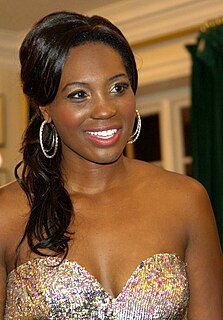Related Research Articles

Porgy and Bess is an English-language opera by American composer George Gershwin, with a libretto written by author DuBose Heyward and lyricist Ira Gershwin. It was adapted from Dorothy Heyward and DuBose Heyward's play Porgy, itself an adaptation of DuBose Heyward's 1925 novel of the same name.

Ruby Pearl Elzy was a pioneer American operatic soprano.

Adele Addison is an American lyric soprano who was a figure in the classical music world during the 1950s and 1960s. Although she did appear in several operas, Addison spent most of her career performing in recital and concert. Her performances spanned a wide array of literature from the Baroque period to contemporary compositions. She is best remembered today as the singing voice for Bess in the 1959 movie, Porgy and Bess. Known for her polished and fluent tone, Addison made a desirable Baroque vocal artist. She can be heard on numerous recordings, of which her Baroque performances are perhaps her best work. Many of her recordings were made with the New York Philharmonic under the baton of Leonard Bernstein.

Angela M. Brown is an American dramatic soprano particularly admired for her portrayal of Verdi heroines.

Camilla Ella Williams was an American operatic soprano who performed nationally and internationally. After studying with renowned teachers in New York City, she was the first African American to receive a regular contract with a major American opera company, the New York City Opera. She had earlier won honors in vocal competitions and the Marian Anderson Fellowship in 1943–44.

Porgy and Bess is a recording of the Glyndebourne Festival Opera version of the George Gershwin opera of the same name. The cast were accompanied by the London Philharmonic Orchestra under the direction of Simon Rattle. The recording took place in February 1988 in No.1 Studio of Abbey Road in London. It was released in 1989.
Karen Williams is an American concert and opera soprano. In 1985 she won the Metropolitan Opera National Council Auditions; making her stage debut at the Metropolitan Opera later that year as Serena in George Gershwin's Porgy and Bess. She sang that role at the Met again in 1989–1990. She has also performed Serena at Symphony Hall, Springfield with the Boston Concert Opera (1986), the Milwaukee Symphony Orchestra (1998), the Buffalo Philharmonic Orchestra (1999), the Utah Symphony Orchestra (1999), and the Philadelphia Orchestra (2000) among others. In 1986 she made her debut with the Opera Company of Philadelphia as Amelia in Verdi's Un ballo in maschera.

Simon Estes is an operatic bass-baritone of African-American descent who had a major international opera career beginning in the 1960s. He has sung at most of the world's major opera houses as well as in front of presidents, popes and internationally renowned figures and celebrities including Bill Clinton, Richard Nixon, Boris Yeltsin, Yasser Arafat, Nelson Mandela and Desmond Tutu. Notably, he was part of the first generation of black opera singers to achieve widespread success and is viewed as part of a group of performers who were instrumental in helping to break down the barriers of racial prejudice in the opera world.
Nicole Cabell is an American opera singer. She is best known as the 2005 winner of the BBC Cardiff Singer of the World Competition.
Florence Quivar is an American operatic mezzo-soprano who is considered to be "one of the most prominent singers of her generation." She has variously been described as having a "rich, earthy sound and communicative presence" as "always reliable" and as "a distinguished singer, with a warm, rich voice and a dignified performing presence." From 1977-1997 she was a regular performer at the Metropolitan Opera where she gave more than 100 performances.

Othalie Graham is a Canadian-American dramatic soprano, known for operatic roles such as Turandot in Turandot, Tosca in Tosca, Minnie in La fanciulla del West, Aida in Aida, Elektra in Elektra and Ariadne in Ariadne Auf Naxos.
Cynthia Haymon-Coleman is an American soprano, born September 6, 1958 in Jacksonville, Florida. She is known for the beauty of her voice and seeming ease with which she uses it, and more recently as a voice teacher. She received a Bachelor's degree of Music in Vocal Performance from Northwestern University. In 2016, she retired from the faculty at the University of Illinois at Urbana Champaign, and presently teaches privately from her studio in Champaign, Illinois.
Donnie Ray Albert is an American operatic baritone who has had an active international career since 1976.

Angel Joy Blue, is an American operatic soprano and classical crossover artist. Her voice has been recognized for its shining and agile upper register, "smoky" middle register, beautiful timbre, and ability to switch from a classical to a contemporary sound. She has performed internationally and won numerous awards including a Grammy Award, Operalia and Miss Hollywood. Plácido Domingo once described her as “the next Leontyne Price”.
Marquita Lister is an American operatic soprano. She has sung with major companies in the U.S. and abroad, specializing in the lirico-spinto repertoire. Lister is considered one of the leading interpreters of Bess in Porgy and Bess, having performed the role hundreds of times in companies across the globe, and she is also renowned for her portrayals of Aida and Salome, two signature roles.

Sara Mingardo is an Italian classical contralto who has had an active international career in concerts and operas since the 1980s. Her complete recording of Anna in Hector Berlioz's Les Troyens won a Gramophone Award and both the Grammy Award for Best Opera Recording and the Grammy Award for Best Classical Album in 2002. Some of the other roles she has performed on stage or on disc include Andronico in Tamerlano, Mistress Quickly in Falstaff, Rosina in The Barber of Seville, and the title roles in Carmen, Giulio Cesare, Riccardo Primo, and Rinaldo. She has also recorded several Vivaldi cantatas, Bach cantatas, and such concert works as Mozart's Requiem, Rossini's Stabat Mater, and Vivaldi's Gloria among others.

Robert Mosley was an American operatic bass-baritone. Part of the first generation of African-American opera singers to achieve wide success, he performed in numerous opera productions, recitals, and in concerts from the 1950s through the 1990s. In 1957 he won the Metropolitan Opera National Council Auditions. He drew particular acclaim for his portrayal of Porgy in George Gershwin's Porgy and Bess, a role which he portrayed in the landmark 1976 Houston Grand Opera production, on Broadway, and at the Metropolitan Opera among other opera companies both in the United States and in Europe.
Claudia Lindsey is an American operatic soprano.
Camellia Johnson was an American concert and opera singer. She began her career performing works from the mezzo-soprano repertoire, but after encouragement from the staff at the Metropolitan Opera retrained her voice as a soprano. She successfully made that transition after winning the Young Concert Artists competition in 1993. She went on to perform as a leading soprano with orchestras and opera companies internationally.
Ruth Siewert was a German contralto and voice teacher. She performed roles by Richard Wagner at major opera houses in Europe and at the Bayreuth Festival, and was known as a singer of oratorio and Lied.
References
- 1 2 3 4 5 6 7 8 9 10 Brooks, Christopher A., ed. (2011). "Cynthia Clarey (1949– )". The African American Almanac, Eleventh Edition. Graves. pp. 1111–1112. ISBN 9781414445472.
- 1 2 3 "Cynthia Clarey". The Los Angeles Philharmonic. Archived from the original on 2017-09-23. Retrieved 2017-09-23.
- ↑ Villecco, Tony (April 2012). "Walking Out On 'La Divina'". Classical Singer Magazine. Archived from the original on 2017-09-23. Retrieved 2017-09-23.
- ↑ Verdino-Sullwold, Carla Maria (February 1991). "No Such Word As 'Can't': The Uphill Struggle of the Black Classical Singer". The Crisis. Vol. 98 no. 2. ISSN 0011-1422 . Retrieved 2017-09-23.
- ↑ Weaver, David E. (2009). Black Diva of the Thirties: The Life of Ruby Elzy. Univ. Press of Mississippi. ISBN 9781628467536.
- ↑ Ruhlmann, William. "Gershwin: Porgy and Bess - Cynthia Clarey, Simon Rattle, Cynthia Haymon, Willard White". AllMusic. Retrieved 2017-09-23.
- 1 2 "Cabaret performance explores songs of 'Broken-Hearted'". Binghamton Press & Sun Bulletin. 16 May 2017. Retrieved 23 September 2017.
- ↑ "Cynthia Clarey" . Retrieved 2017-09-23.